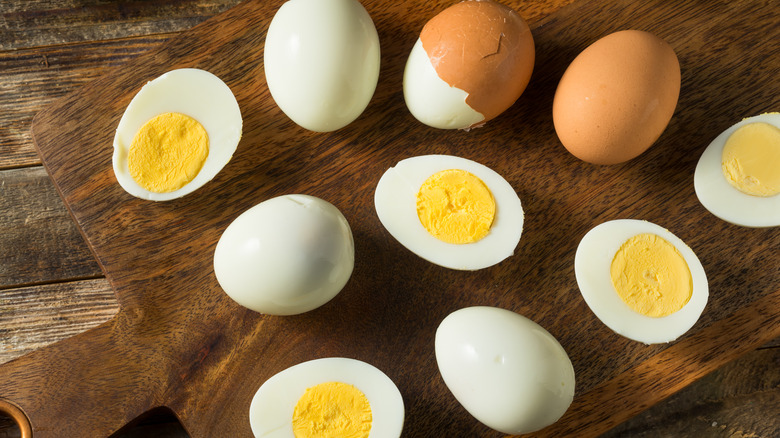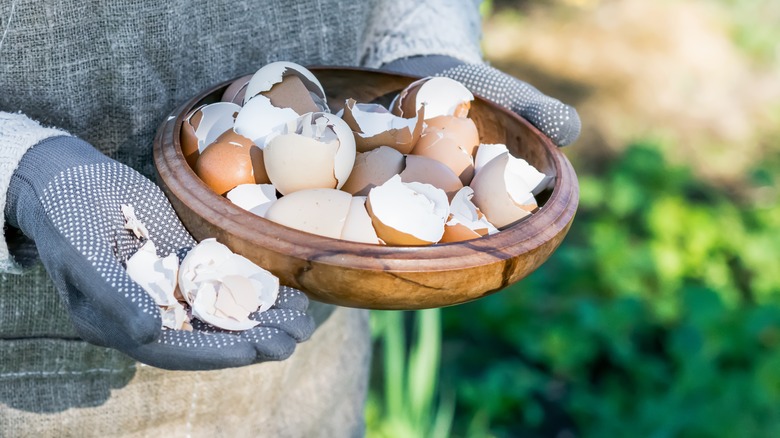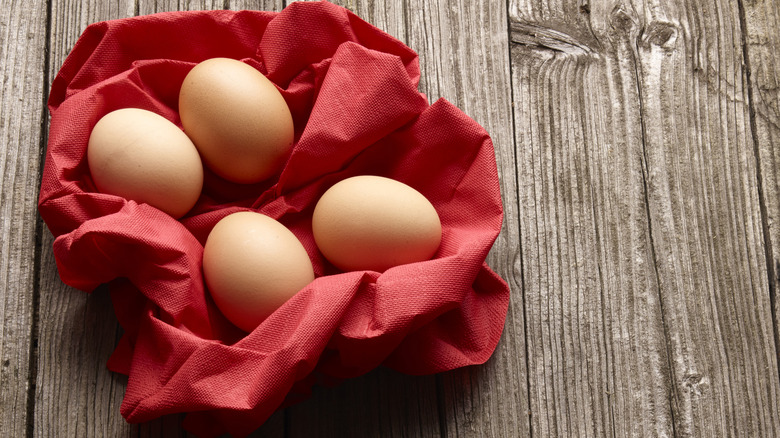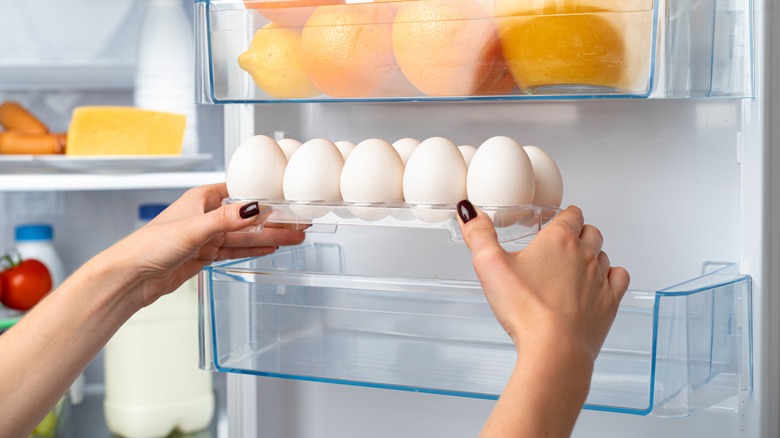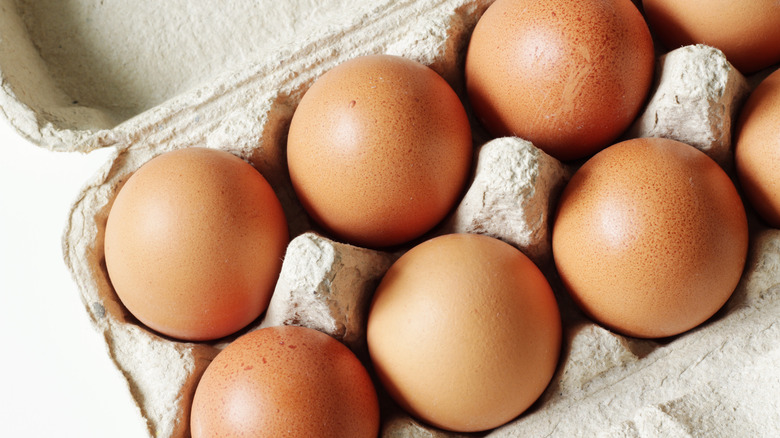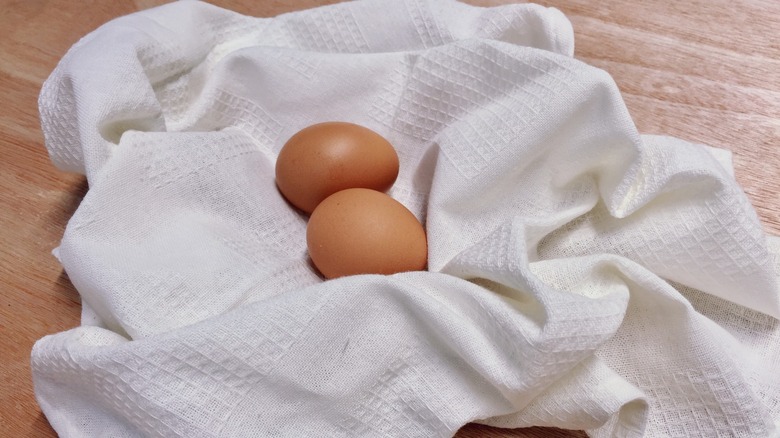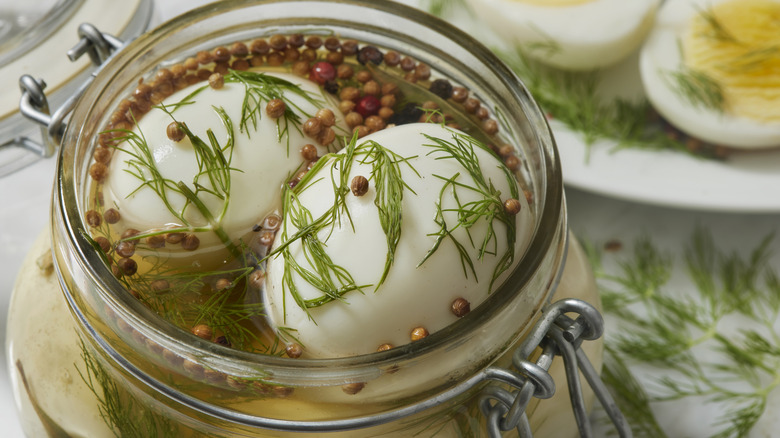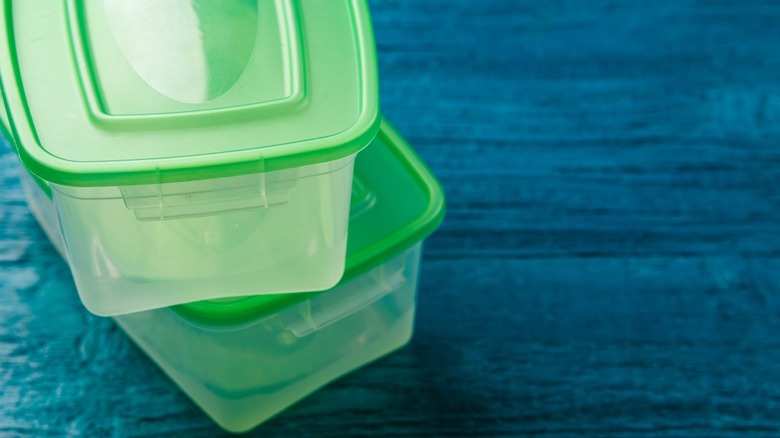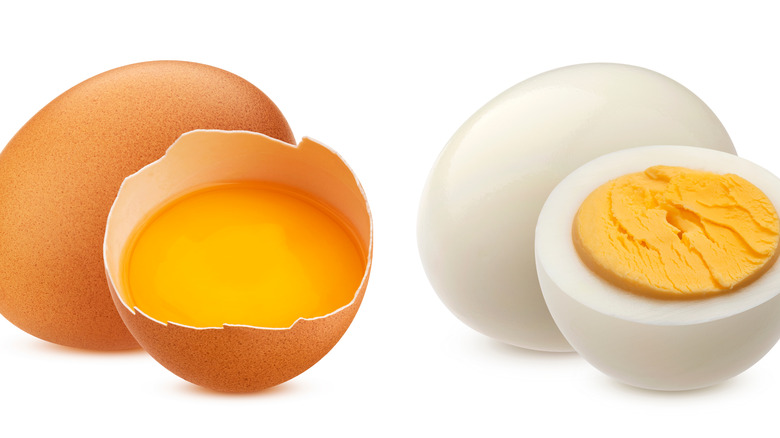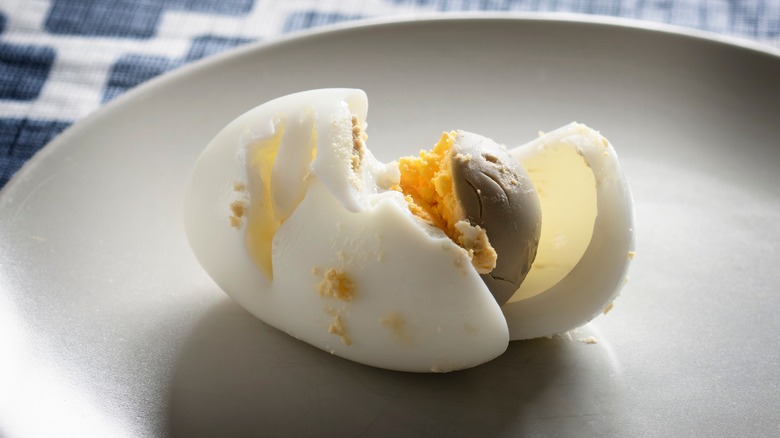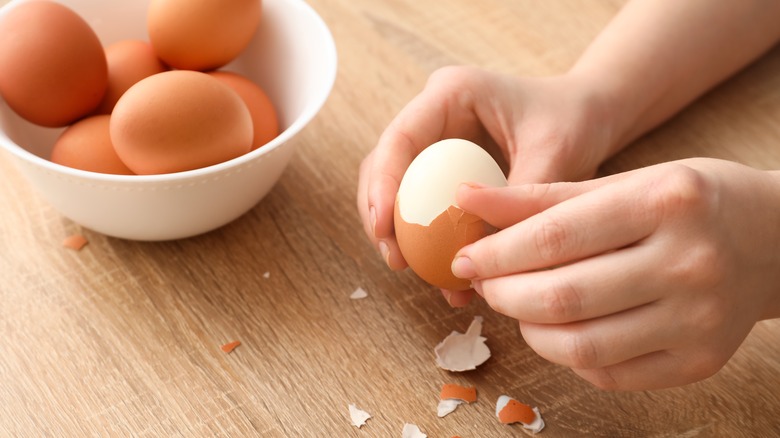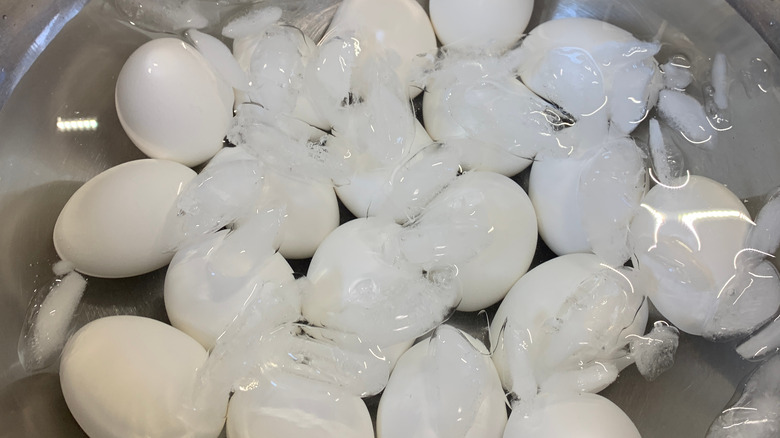12 Tricks For Prolonging Your Hard-Boiled Eggs' Fridge Life
The convenience and simplicity of hard-boiled eggs can't be beaten, except when it comes time to store them. Notoriously funky-smelling and finicky to keep fresh, hard-boiled eggs can be difficult to keep around. So, how can you prolong the life of your hard-boiled eggs? And what are some of the best practices you should consider when it comes time to safely place these protein-packed snacks into the fridge?
If you have already put in the effort to perfect your hard-boiled egg recipe, now's the time to master storing them. Today, we'll go over 12 different tips and tricks for keeping your hard-boiled eggs fresher, for longer. Not only will we discuss how to prolong the life of your in-shell hard-boiled eggs, but we'll also go over how you can keep your peeled eggs happy. This way, this convenient snack will stay convenient. Now, get egg-cited to check out these ideas!
1. Keep the shells on
Your eggs come with a protective layer. Why fight what nature perfected? By storing your hard-boiled eggs in the refrigerator with the shell on, you prolong their freshness and extend their lifespan overall.
While you may want to get a jump on your food prep and opt for peeling your boiled eggs, consider keeping them intact if you want a bulk batch of eggs to last. When left in their shells, hard-boiled eggs can be kept under refrigeration for roughly seven days. Peeled eggs lack the protection that their shell typically affords them. Their average shelf life is only about three days. So, it's best to leave them be until you're ready to eat them.
If you don't want to leave your eggs in their shells for convenience's sake, there are a few different ways you can keep peeled eggs fresh for longer. Just always remember that peeled eggs won't last as long!
2. Dry the eggs well
Bacteria and mold thrive in moisture, which is just one reason why you should make sure your hard-boiled eggs are adequately dried after cooking. Regardless of whether you leave your eggs unpeeled, or opt for peeled eggs, take an extra second to wipe them off with a clean cotton cloth or paper towel. If you leave your eggs in their shells, wait to do this step until after they've finished cooling in their ice bath.
By keeping moisture at a minimum, you prolong the lifespan of your hard-boiled eggs and avoid exacerbating any bacteria that may be present. While the shell protects your boiled eggs from some issues surrounding freshness, mold and harmful bacteria are capable of growing on your shells in particular. When you consider the fact that there are roughly 10,000 pores found along the shell of your hard-boiled eggs, it's not worth it to leave water lingering. You never know what bacteria might thrive there if left unattended!
3. Store them on middle fridge shelves
Did you know that hard-boiled eggs are best kept on the shelves of your fridge as opposed to in the refrigerator door? Temperatures within the doors of your fridge fluctuate far more than the temperatures found along the shelves. Keeping them in the central storage shelves of your fridge, rather than on the door, will help maintain a more constant temperature within your eggs — whether they have been cooked or not.
Temperature control of your hard-boiled eggs is a must when it comes to expanding their lifespan. While it may mean your fridge needs a bit of reorganizing to make room for your hard-boiled egg armada, this is one of the simplest methods you can try. Plus, this tip is designed to help out both peeled and unpeeled hard-boiled eggs. While this won't drastically improve the longevity of your hard-boiled eggs, it's worth trying — especially if you've been keeping this handy snack in your fridge door more often than not!
4. Keep the eggs in cardboard
The simplest methods are often the most effective. That's why you may want to consider keeping your empty cardboard egg carton and utilizing it to store your hard-boiled eggs too. Keep in mind that styrofoam egg cartons won't be of any use for this tip, because they don't absorb water like cardboard does. But, while you shouldn't try out this technique for peeled eggs, unpeeled hard-boiled eggs do well in their cardboard vessels for one very simple (and familiar) reason: moisture control.
After you've dried your shell-on eggs, place them back in their carton and into the fridge. Not only does the carton offer protection for your eggs, but it also helps absorb any excess moisture and odors surrounding your snacks. Keep in mind that labeling your egg carton after filling it back up may be a good idea. Anyone in your household may assume that the carton is full of raw eggs otherwise!
5. Wrap them in cloth
Another tip for you in-shell hard-boiled egg lovers: keep your cooked snacks wrapped in a towel in the fridge. Keeping them in a paper towel or cotton cloth may help manage the moisture, temperature, and odors that so often plague hard-boiled eggs. This is a great alternative to keeping your eggs in a cardboard carton (which also helps reserve moisture) if your eggs didn't come in cardboard or you already threw the carton away.
While it may feel strange, storing them with a towel may prolong their overall shelf life. Just like it's important to change the water that's keeping your peeled eggs happy, you may want to change the towel around your in-shell eggs too. However, you won't need to do this daily. Opting for a fresh paper towel every three days is plenty, as your hard-boiled eggs won't encounter too many bacterial issues so long as they're left in their shells.
6. Pickle your peeled eggs
While unconventional, you should consider brining or pickling your hard-boiled eggs to prolong their shelf life. If you don't have a go-to pickled egg recipe, now's the time to get inspired or experiment to see what speaks to you. If you opt to pickle your eggs, they'll last for over a month in your fridge, peeled and ready to go. No other tip on this list can get your eggs to last so long.
And what's even better: pickled eggs taste delicious. You can spice your eggs however you like so long as they get a vinegar soak. Or you can get even more adventurous and consider a salt brine for your boiled eggs, a technique that further extends their life and flavor. Salted egg yolks are popular in many cuisines and offer a rich depth of flavor to this classic snack. If you're feeling adventurous, you can also give this method a try.
7. Avoid storing them near odorous items
We've all forgotten about leftovers or old produce stashed in the back of the fridge before. Things can get smelly in your refrigerator, and fast. But it's important to consider any adverse smells or odors emitting from this mainstay appliance when adding hard-boiled eggs to your fridge. Not only do boiled eggs come with a smell of their own — but they may also absorb or get mistaken for other, more odorous items.
The main reason why you might not want to store hard-boiled eggs near smelly things in your fridge is because it may make it more difficult to tell when they've gone bad. Eggs aren't worth consuming once their odor seems off and it's far better to toss them than risk consuming them. Proper storage and fridge cleanliness can go a long way in terms of prolonging the life of your hard-boiled eggs. If not, you might end up tossing your hard-boiled eggs well before their time is up!
8. Store peeled eggs in air-tight containers
Whether you opt for peeled or unpeeled eggs, storing them in air-tight containers is always a good idea. Unpeeled hard-boiled eggs do best in sealed containers after being cooled and dried, especially because they may stink up your fridge otherwise. This is also the case for peeled hard-boiled eggs. Even if you choose not to keep them in a bowl of water, peeled eggs must be kept in a sealed container to avoid odors and spoiling.
Another benefit of keeping boiled eggs in an air-tight container is that they won't dry out. Without their shells, peeled eggs don't stand a chance against the cold and dry climate of the average fridge. By keeping them in a reliable bin, with or without water, your peeled eggs are more likely to last. However, it is still recommended to consume your peeled hard-boiled eggs within three days.
9. Freeze the yolks
It is easy to make too many hard-boiled eggs, which is why you may be interested in freezing them. You can only keep your boiled eggs fresh for so long, after all! While it is possible to freeze hard-boiled eggs, they shouldn't be frozen whole. Here's the best way to freeze them. Peel your eggs and remove the yolks. Keep the yolks in a container and freeze them for up to four months to maintain their quality.
Toss the egg whites. Freezing your boiled egg whites isn't recommended because of how much their quality might suffer. Egg whites can get dry, crumbly, and otherwise inedible upon defrosting from the freezer, which is why it's best to avoid doing so. However, you can freeze raw egg whites and raw whole eggs with little issue, which is something to keep in mind if you happen to have an excess of uncooked eggs on your hands!
10. Avoid cutting your peeled eggs
One of the most dreaded aspects of cooking hard-boiled eggs is the possibility of discoloration. Boiled egg yolks can turn gray or green if they're overcooked, old, or prepared at too high a temperature. But did you know your hard-boiled eggs may also suffer from discoloration if you cut them and keep them in your fridge? Whether you slice your boiled eggs into thin slices for a salad or cut them in half for deviled eggs, preparing your hard-boiled eggs too early may result in adverse colors.
It's recommended to always leave your hard-boiled eggs whole and uncut when stored in the fridge until ready for use. Not only does this help you avoid dry, tough peeled eggs. It also helps you avoid tossing your hard-boiled eggs too soon due to their unappetizing color. However, gray eggs can be edible. But seeing your beautiful yellow yolk turn gray after slicing and storing it may not make this snack look as delicious as it did before.
11. Store peeled eggs in water
If you've been feeling discouraged about how possible it is to store peeled eggs, there's good news: it's indeed possible with the right techniques. While hard-boiled eggs left in their shells can be kept for a week in cartons or bowls in your fridge, peeled hard-boiled eggs will last nearly as long if they're kept in water. This lets you keep peeled eggs handy for your entire household so that no one needs to waste time peeling their breakfast on busy mornings.
After your eggs have cooled, peel them and let them rest in a sealable container. Cover them in cold water and place the lid on your chosen vessel. So long as you store your peeled eggs on the middle shelf of your fridge, they'll remain fresh when left in water for around two days.
However, keep in mind that you'll need to do a bit of maintenance so that your peeled eggs can last. Be sure to change your egg water daily to avoid bacteria and other potential issues surrounding freshness.
12. Cool the eggs down after you cook them
Properly cooling your hard-boiled eggs is a must, as it benefits your eggs in multiple ways. By using an ice bath, you'll end your hard-boiled egg's cooking process, making them less likely to be overcooked when you peel them. Additionally, a 1974 study published in Poultry Science found that utilizing an ice bath for your boiled eggs may also make them easier to peel. This is a must for any hard-boiled egg recipe.
Once your eggs are done cooking, remove them from their hot bath immediately. Place the eggs in a bowl full of ice and cold water. Then, allow them to sit in the ice bath for no more than two hours before refrigerating them. However, take note of this tip if you want to keep your hard-boiled eggs fresh: If you leave them sitting in an ice bath any longer than two hours, you may risk common bacterial complications that often accompany foods left at room temperature for too long. Remember this the next time you choose to use an ice bath for your eggs.
